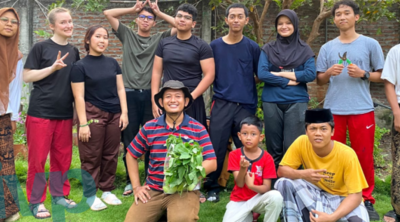Decolonizing is an active process, not a passive one
Interview with Sara Vaca, an Equatorian volunteer living in Austria. The interview was conducted in Brussels during a CCIVS event addressing decolonizing volunteering. Sara has already produced extensive work on decolonizing volunteering issues with SCI Austria, and here she is presenting key ideas to keep in mind when working towards greater reciprocity in collaboration with Global South’s countries.
Hello Sara, can you introduce yourself and tell us why you’re here?
My name is Sara Vaca, I am from Ecuador and I’m co-facilitating the “Decolonize volunteering” seminar organized by SCI Belgium, along with Filipe Alves who is a researcher. I discuss issues of neocolonialism and decolonization in the context of volunteering.
Decolonizing volunteering, what does it mean for you?
This is a broad question. What comes first to my mind, is that it is a deconstruction process of the way we apprehend volunteering, a change of use from saying “help” to “collaborate, co-create, co-define”. Volunteering has always interrogated me, it’s important to realise that things we get out of it are mainly personal, regardless of whether we’re from the “North” or the “South”. When we realize this, we start to apprehend volunteering differently; as a contribution, a progress for oneself. However, even though we are giving this time for ourselves – not for others or the hosting organization- we are still responsible for how we do it and for collaborating and contributing to something else.
What kind of action should we take to change volunteers’ and organisations’ mindsets?
The deconstruction process starts with very individual action. It can be triggered by knowledge, experiences, meeting people… You don’t need to leave everything to change your mindset. You can inform yourself, read and listen, go to more intercultural places to hear about different experiences to help deconstruct yourself, and so on. Decolonizing is an active process, not a passive one. You must look for it.
The same applies to organizations themselves. A volunteering organization does not only need to educate about it, but it should also consider the deconstruction process internally. As individuals, self-reflection is essential: how can we work to change this? We must start by ourselves and then, put it into practice within our organization. This is not news; a lot of organizations have already reflected on this topic. Good practices exist, so why not try to implement them?
To be able to say “I want my organization to have a decolonizing view on this topic” the first step is to establish a strict framework. And if we stay on this track, at some point we reach our first objective, and so on. An essential point to reach this objective though, is to include voices from the South; not only listening to them but involving them in the choices to be made and co-creating areas for exchange of knowledge. Doing this brings us to think from a collective action perspective. Instead of thinking within our organisations, we need to think “Maybe other organisations could work with me on this topic so let’s do something meaningful together that will benefit everyone”.
Volunteering in the South countries shouldn’t be questioned to its core? Why choose to keep doing it?
We must think globally, not only from the Global North perspective. Yes, we feel like we are probably creating more issues over there, and acting according to our values is very difficult. However, we also need to think about South organisations: why are they accepting volunteers? Maybe because of inequalities, because they need support at some point. So, if the North organization chooses not to send volunteers anymore, it will probably get better after a while, but first, it would be difficult to adapt. There is a risk in many organizations, especially for vulnerable people. I think we should instead reevaluate our work and change this “I help” mindset to a “We are exchanging” one. If we start to consider volunteering as a win-win situation, and not as a help to those in need, we will consider volunteering in a non-colonial manner. Because if we think about help, it implies that people in front of us don’t know how to do things. That’s why I’m saying again we need to rethink and redefine how we consider volunteering and redefine it.
In terms of partnerships between South and North organisations, how can we decolonize ourselves and make sure it’s a genuine/true collaboration?
The question of leadership and empowerment is fundamental. Everyone needs a safe space where they feel they can express themselves, but the conditions of this space depend on culture. If you are used to witnessing women listening in your culture, then it would be harder for you, as a woman, to speak up. Another example: in Indonesia or Togo, we speak more freely over a meal, and this is where interesting discussions take place. In contrast, when discussions happen in a very strict framework such as a conference, people will just listen because they have been used to strong hierarchical processes as part of their education.
What often happens is that even though you are in an intercultural group, discussions are dominated by white people. It is not voluntary, and I don’t blame anyone, but it is natural and it’s part of the leadership question. Each culture has its own way of being in the world and it is essential to explore those questions when we collaborate with people from different cultures. For
example, you can simply ask “How can I make you feel more comfortable? What do you need to feel comfortable?” It’s more about creating a setting where everyone is allowed to express themselves, not only in activities but also in the cocreation process.
Interviewed by Isabel Lethé, volunteer at SCI Belgium
Explore more news
Emma’s Testimony from the No More War Open Forum
“No More War” is more than a slogan – it’s a global network of activists taking action against the militarization of our world. Emma, a SCI volunteer, took part in the Open Forum in Bulgaria and shares her experience. At a time when militarism is on the rise – with escalating armed conflicts, record-high defense budgets, the normalization of genocides, and the return of conscription in several...
Tobias Drilling: SCI’s voice in the Council of Europe!
Tobias, a staff member at SCI Switzerland, was nominated by SCI to be a candidate to the Council of Europe’s Advisory Council on Youth and an advocate for youth rights & global justice. The Advisory Council on Youth, made of 30 representatives from youth NGOs and networks in Europe, brings the voices of young people to the Council of Europe (CoE). As a non-governmental partner to the CoE, it...
Supporting Community Urban & Peri Urban Permaculture Gardens in Semarang
Sendangguwo Permaculture Camp has been attended by 2 Indonesian Volunteers, 15 part-time Indonesian volunteers, and a volunteer from Germany named Anna. Ifa and Sany are camp leaders at the workcamp located in Semarang, Indonesia, from the 14th to the 27th of April 2025. Permaculture has become a hot topic for young people in Indonesia. Because there is not much literature available in...




